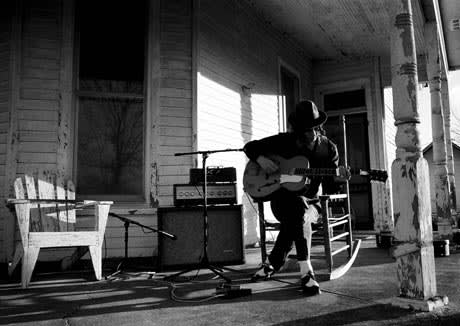It Might Get Loud is an eccentric project. It's not a concert film, a biography, or even a documentary in the most conventional sense. It seems as though director Davis Guggenheim, following his Oscar win for An Inconvenient Truth, decided to just make whatever the hell he wanted. And what he wanted to do was film Jack White, Jimmy Page and the Edge together and apart to create a meditative film about the artistic process, with the electric guitar as a common thread. Fortunately, the results are both insightful and entertaining.
Individually, each member of the trio explores a personal space. The Edge visits the high school where he first hooked up with U2; Jack White hangs out in a Tennessee farmhouse; and Jimmy Page tours the English country house where Led Zeppelin's fourth album was recorded.
When the three get together, there isn't the big jam the filmmakers were perhaps expecting. They play some tunes but it only helps illuminate just how different they are from one another stylistically: Jack has a raw, aggressive style; Jimmy is more elegant; and the Edge's sound is dependent upon pedals and effects. The film embraces these differences, examining the cultural conditions that shaped each musician's artistic approach, allowing each player to candidly discuss the origin of their trademark sound.
Despite the fact that each of them is the product of a different generation, they chat together as equals and friends. That is until Jimmy Page shows the other two how to play "Whole Lotta Love" and the childlike adoration in White and the Edge becomes palpable.
They talk about influences with one another; Page almost salivates over Link Wray's "Rumble" and White listens to "Froggie Went A-Courtin'" as interpreted by Flat Duo Jets. I don't really like U2 but was surprised and impressed by how articulate and thoughtful the Edge is. Along with White's precociousness and Page's veteran wisdom, it makes for three unique musical perspectives.
The film is slow and requires some investment on the part of the viewer but you don't have to be a guitar player to enjoy it - anyone interested in creative process or the ubiquity of expression can take something from this film. This is a strange experiment that paid off.
(Thomas Tull)Individually, each member of the trio explores a personal space. The Edge visits the high school where he first hooked up with U2; Jack White hangs out in a Tennessee farmhouse; and Jimmy Page tours the English country house where Led Zeppelin's fourth album was recorded.
When the three get together, there isn't the big jam the filmmakers were perhaps expecting. They play some tunes but it only helps illuminate just how different they are from one another stylistically: Jack has a raw, aggressive style; Jimmy is more elegant; and the Edge's sound is dependent upon pedals and effects. The film embraces these differences, examining the cultural conditions that shaped each musician's artistic approach, allowing each player to candidly discuss the origin of their trademark sound.
Despite the fact that each of them is the product of a different generation, they chat together as equals and friends. That is until Jimmy Page shows the other two how to play "Whole Lotta Love" and the childlike adoration in White and the Edge becomes palpable.
They talk about influences with one another; Page almost salivates over Link Wray's "Rumble" and White listens to "Froggie Went A-Courtin'" as interpreted by Flat Duo Jets. I don't really like U2 but was surprised and impressed by how articulate and thoughtful the Edge is. Along with White's precociousness and Page's veteran wisdom, it makes for three unique musical perspectives.
The film is slow and requires some investment on the part of the viewer but you don't have to be a guitar player to enjoy it - anyone interested in creative process or the ubiquity of expression can take something from this film. This is a strange experiment that paid off.
